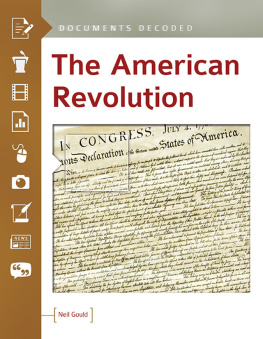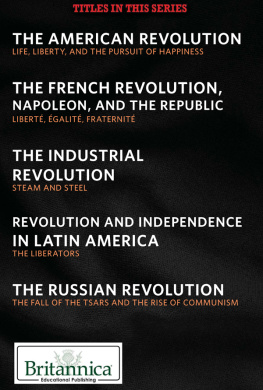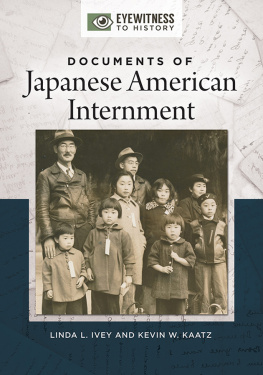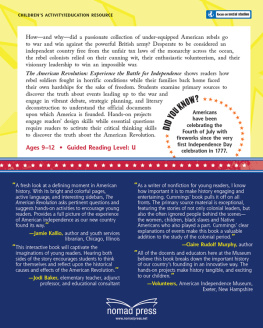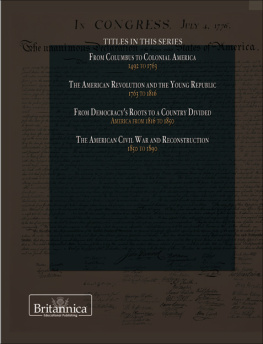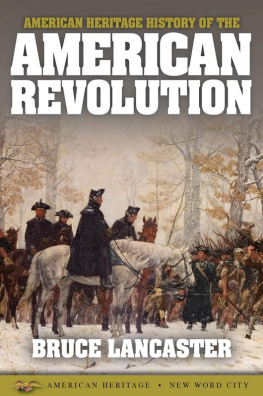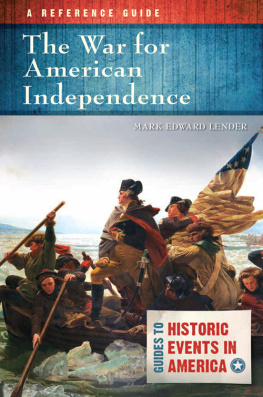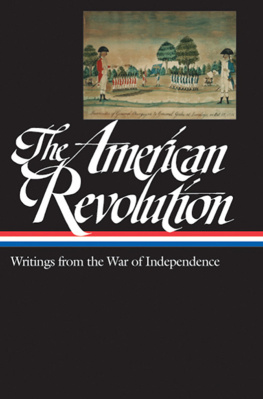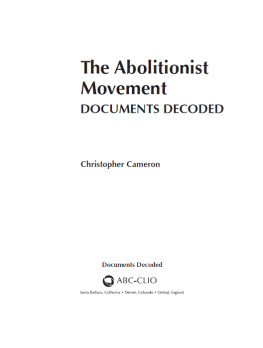The American Revolution
Documents Decoded
The ABC-CLIO series Documents Decoded guides readers on a hunt for new secrets through an expertly curated selection of primary sources. Each book pairs key documents with in-depth analysis, all in an original and visually engaging side-by-side format. But Documents Decoded authors do more than just explain each sources context and significancethey give readers a front-row seat to their own investigation and interpretation of each essential document, line by line.
Titles in ABC-CLIO's Documents Decoded Series
The Democratic Party: Documents Decoded
Douglas B. Harris and Lonce H. Bailey
The Republican Party: Documents Decoded
Douglas B. Harris and Lonce H. Bailey
1960s Counterculture: Documents Decoded
Jim Willis
Founding Documents of America: Documents Decoded
John R. Vile
Presidential Power: Documents Decoded
Brian M. Harward
The Early Republic: Documents Decoded
John R. Vile
The Jacksonian and Antebellum Eras: Documents Decoded
John R. Vile
Freedom of Speech: Documents Decoded
David L. Hudson Jr.
The Civil War and Reconstruction Eras: Documents Decoded
John R. Vile
Church and State: Documents Decoded
David K. Ryden and Jeffrey J. Polet
Alexander Hamilton: Documents Decoded
Christina Villegas
Equal Protection: Documents Decoded
David L. Hudson Jr.
The American Revolution
Documents Decoded
Neil Gould
Copyright 2018 by ABC-CLIO, LLC
All rights reserved. No part of this publication may be reproduced, stored in a retrieval system, or transmitted,
in any form or by any means, electronic, mechanical, photocopying, recording, or otherwise, except for the
inclusion of brief quotations in a review, without prior permission in writing from the publisher.
Library of Congress Cataloging-in-Publication Data
Names: Gould, Neil, 1943author.
Title: The American Revolution : documents decoded / Neil Gould.
Description: Santa Barbara, California : ABC-CLIO, 2018. | Includes bibliographical references and index.
Identifiers: LCCN 2018014201 (print) | LCCN 2018016527 (ebook) | ISBN 9781440839474 (ebook) |
ISBN 9781440839467 (alk. paper)
Subjects: LCSH: United StatesHistoryRevolution, 17751783Sources.
Classification: LCC E203 (ebook) | LCC E203 .G64 2018 (print) | DDC 973.3dc23
LC record available at https://lccn.loc.gov/2018014201
ISBN: 978-1-4408-3946-7 (print)
978-1-4408-3947-4 (eBook)
22 21 20 19 18 1 2 3 4 5
This book is also available as an eBook.
ABC-CLIO
An Imprint of ABC-CLIO, LLC
ABC-CLIO, LLC
130 Cremona Drive, P.O. Box 1911
Santa Barbara, California 93116-1911
www.abc-clio.com
This book is printed on acid-free paper 
Manufactured in the United States of America
For Alan and Nathan: This is your heritage.
Contents
The American Revolution, like all great moments in human history, was a series of events that involved both hearts and minds: the hearts and minds of the Englishmen settled in the New World, and those of the Englishmen who were determined to rule them from the fastness of their tight little island beyond the sea.
The documents that follow reflect events and feelings, without which it is doubtful that the unlikely colonial triumph over Great Britain would have occurred. We hear the voices not only of the founding fathers who speak to us with unforced eloquence, but also the barely literate recollections of simple soldiers whose blood supplied the lubricant that drove the engine of revolt, from the hopeful springtime of Lexington and Concord to the glorious autumnal victory at Yorktown. We hear also the childish innocence of a young girl witness to the depredations of the redcoats encamped on Boston Common, and the songs and ballads of a people inured to pain and loss whose response was a mocking rebuke to tyranny.
I hear America singing, what varied carols she sings, Walt Whitman wrote. How often the American response to hard times is expressed in song and verse. Those first songs were songs of revolution.
By the rude bridge that arched the flood
Their flag to Aprils breeze unfurled
Here once the embattled farmers stood
And fired the shot heard round the world.
Emersons eulogy to the minutemen in his Concord Hymn gave us that famous phrase. And indeed, the American Revolution was the first shot of an international movement of men and women determined to break free of political and economic restraint. It was a tidal wave in a revolutionary flood that engulfed France, Austria, Italy, Prussia, and Russia; by the first decades of the 20th century, that flood had washed away forever the seemingly rock solid basis of Western civilization that had persisted for a millennium.
The American Revolution was not just a war for independence; it was also a civil war. Americans were divided. There were Tories loyal to the Crown, and patriots who would hear nothing of cooperation. There was a sectional split between northern and southern interests that anticipated the cataclysm of the 1860s. Tragically, this split was reflected on a smaller scale within families, brother against brother, father against son. But for all that, this was not a conflict of classes, for among the elite of society, as well as among journeyman and farmers, there were patriots and loyalists. There was also a philosophical basis for revolution penned most famously in the Declaration of Independence. Americans proclaimed their rights both as Englishman and as human beings, natural rights guaranteed by God.
That the intellectual fathers of the revolution (Adams, Jefferson, Paine, and Hamilton) were essentially conservatives is reflected in the fortunate fact that despite the miseries that attend all armed conflict, the American Revolution never deteriorated into government-sponsored horrors like the reign of terror. Of course, there were massacres and carnage, but by and large the great battles of the war were fought according to the battle ordinances practiced by civilized nations. If it is possible to speak of decent warriors, such were those who fought the revolution.
To tell the story of the American Revolution in an objective way, it was necessary to divide the task in order to conquer it. It was necessary to collect and choose between a vast corpus of memoirs, letters, diaries, and writings, then to arrange these into topic areas, some of which have been extensively explored, others less so. The first section of this volume is devoted to the run-up to revolution and gives historical and philosophical context to the events that led to the outbreak of armed conflict. The second section naturally follows, presenting accounts of both major battles and minor skirmishes. For both of these sections I have chosen multiple accounts of actions, seen from both the American and British perspectives. These first sections present materials that have been widely discussed for over 250 years.
For many years, historians agreed that the cause of the American Revolution was the passage by Parliament of a series of acts designed to force the colonies to raise money to help pay for the protection Britain had provided during the French and Indian War. The war resulted in the defeat of French colonial ambitions in the North American territory. It removed a threat to the inhabitants of British America. Wars are expensive. Parliament felt justified in forcing the colonials to pay for their own defense. But Parliaments actions restricted the activities of the colonists who, because of their physical separation from the mother country, had for more than a century grown accustomed to exercising their economic and political freedoms. The colonists saw Parliaments actions as an attempt to increase control over them.

